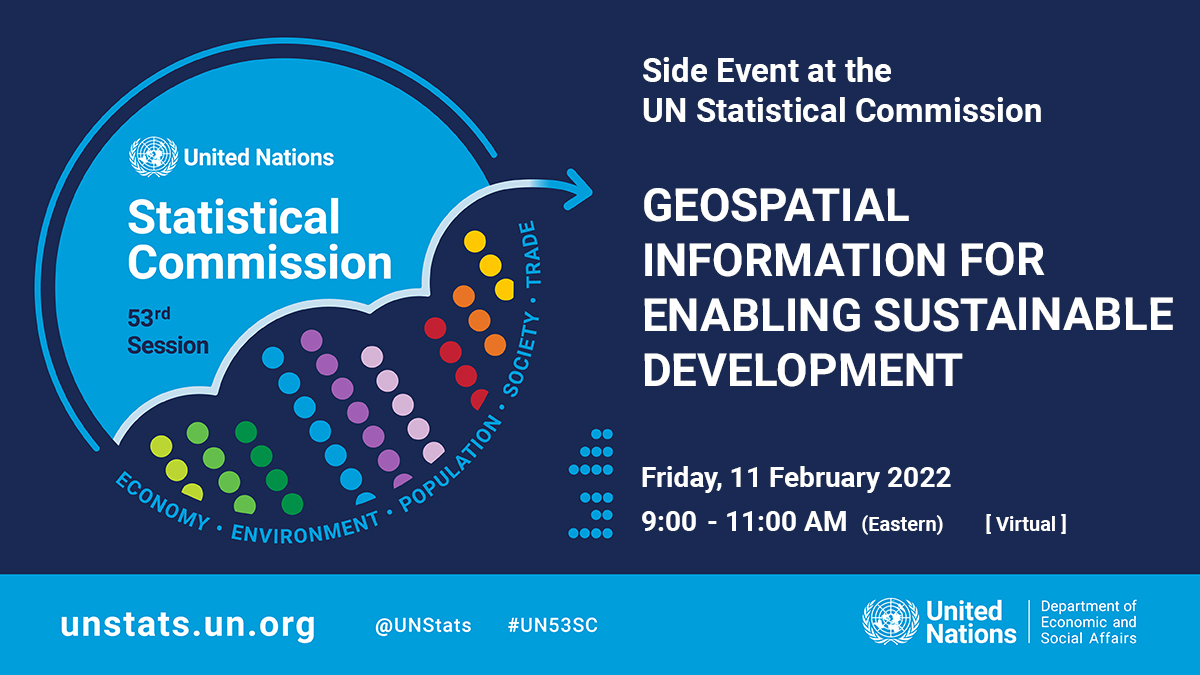United Nations Statistical Commission
Overview 53rd Session (2022) Side Events

Concept note
The SDGs Geospatial Roadmap outlines how to 'build the bridge' between the statistical and geospatial actors working within the global indicator framework and communicates the vision to see geospatial and location-based information being recognised and accepted as official data for the SDGs and their global indicators. Through three phases: Phase 1. Prepare and Plan; Phase 2. Design, Development and Testing; and, Phase 3. Measuring, monitoring and reporting geospatially enabled SDG indicators; the SDGs Geospatial Roadmap will provide National Statistical Offices (NSOs) and Systems (NSS) with key recommendations and guidance to enable the transformational potential of geospatial information to be harnessed while mitigating potential complexities around its use.
The SDGs Geospatial Roadmap recognises that while the NSOs are often key actors in supporting the integration of data across the national data ecosystem; this ecosystem often extends beyond the NSO, and can include the National Geospatial Information Agency (NGIA), the national (or regional) space agency, custodian agencies of the UN System and other stakeholders within the data community. Significantly, innovations within the geospatial information and Earth observations communities, and their enabling technologies, can be leveraged to transform the measurement, monitoring and production of indicators to support the transformation 'leapfrogging' of countries that currently lag behind.
Developed by the IAEG-SDGs' Working Group on Geospatial Information (WGGI), the SDGs Geospatial Roadmap is submitted for adoption by the IAEG-SDGs to this 53rd session of the Statistical Commission. Through this side event, the substance and intent of the SDGs Geospatial Roadmap is to be socialised to Member States and other stakeholders within the Statistical community. The side event will also launch the interactive Storymap of the SDGs Geospatial Roadmap.
Introducing the Global Statistical Geospatial Framework Implementation GuideIn its decision 51/123, the Statistical Commission adopted the Global Statistical Geospatial Framework (GSGF) and noted the increasing relevance of and need for the integration of statistical and geospatial information as an important bridge to enable the production of harmonized, standardized and integrated, geospatially enabled statistical data to facilitate data-driven decision-making, in particular with regard to the implementation of the 2020 round of population censuses and the SDGs.
Now, the Expert Group on the Integration of Statistical and Geospatial Information (EG-ISGI) presents the GSGF Implementation Guide to the Statistical Commission for endorsement. The GSGF Implementation Guide aims to further assist countries with the implementation and operation the GSGF, providing guidance for each GSGF Principle, and identifying key resources and further reading. Further, the Guide is accompanied by the experiences of 30 Member States and five regions in their efforts in their experiences of implementing the GSGF.
SummaryGeospatial information is a critical resource that can be better leveraged to help transform the measurement, monitoring and production of SDG indicators, enabling the 'leapfrogging' of countries that currently lag behind. In recognising the potential of geospatial information, recently within decision 51/101, the Statistical Commission encouraged further work on better integration of geospatial and statistical information to better monitor the 2030 Agenda.
Consisting of two interlinked segments, this Side Event brings together actors and experts from both the statistical and geospatial communities. The first segment sets the scene for the side event and introduces the SDGs Geospatial Roadmap. The second situates and contextualises the GSGF Implementation Guide. The side event is organised by the IAEG-SDGs WGGI and the EG-ISGI.
Resources:- Concept note, proposed agenda and meeting links
- SDGs Geospatial Roadmap (English)
- SDGs Geospatial Roadmap (French)
- SDGs Geospatial Roadmap (Spanish)
- The Global Statistical Geospatial Framework: Implementation Guide
- SDGs Geospatial Roadmap Storymap
- Presentation by Paloma Merodio, Mexico
- Presentation by Céline Jacquin, Mexico
- Presentation by Kevin McCormack, Ireland
- Presentation by Sandra Moreno, Colombia
- Presentation by Osamu Ochiai, Japan
- Presentation by Lorenzo De Simone, FAO
- Presentation by Alex Mudabeti, Namibia
- Presentation by Peter Murphy, Canada
- Presentation by Horacio Castellaro, UN ECLAC
- Presentation by Jerker Mostrom, Sweden & Jørn Undelstvedt, Norway